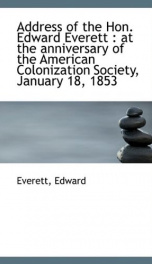Everett Edward
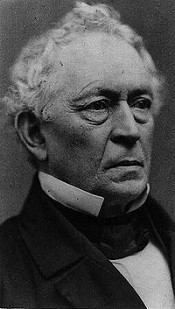
Edward Everett (April 11, 1794 – January 15, 1865) was a Whig Party politician from Massachusetts. Everett was elected to the United States House of Representatives and United States Senate, and also served as President of Harvard University, United States Envoy Extraordinary and Minister Plenipotentiary to Britain, and Governor of Massachusetts before being appointed United States Secretary of State by President Millard Fillmore to fill the vacancy caused by the death of Daniel Webster. Mentioned in the book "The Perfect Tribute," Everett was an unsuccessful candidate for Vice President of the United States in the 1860 election on the Constitutional Union ticket. In 1863 he delivered a two-hour Gettysburg Oration that has been eclipsed in history by President Lincoln's two-minute Gettysburg Address, which Everett praised as superior to his own. He was the father of congressman William Everett and the great uncle of Edward Everett Hale. Born in Boston, Massachusetts, to the Rev. Oliver Everett and Lucy (Hill) Everett, he attended Boston Latin School and graduated as the valedictorian from Harvard University in 1811, studied theology under the urging of the Rev. Joseph Stevens Buckminster, and was ordained pastor of the Brattle Street Church, Boston, in 1814. He was the first American to receive a Ph.D.. His brother Alexander Hill Everett was a noted diplomatist and man of letters. On May 8, 1822 Edward Everett married Charlotte Gray Brooks, daughter of Peter Chardon Brooks and Ann Gorham. They had six children: Everett was a professor of Greek literature at Harvard University, an overseer of the University, and its president from 1846 to 1849. He was elected to the United States House of Representatives and served from March 4, 1825 to March 3, 1835. He declined to be a candidate for renomination in 1834. Everett also had a love for mathematics as can be seen from his probably most famous quote: ‘In the pure mathematics we contemplate absolute truths which existed in the divine mind before the morning stars sang together, and which will continue to exist there when the last of their radiant host shall have fallen from heaven.’ Everett served as Governor of Massachusetts from 1836–1840. He was then appointed United States Envoy Extraordinary and Minister Plenipotentiary to Great Britain from 1841 to 1845 and declined a commission to China in 1843. He served as president of Harvard University from 1846–1849. In 1852 he was appointed United States Secretary of State by President Millard Fillmore to fill the vacancy caused by the death of Daniel Webster, and served until the end of the Fillmore Administration, March 3, 1853. He was elected to the United States Senate and served from March 4, 1853, until his resignation, effective June 1, 1854. On Thursday, April 6, 1854, he presented a petition from the people of Dedham against the Missouri Compromise and one from the people of Gettysburg, Pennsylvania in favor of securing religious freedom for Americans abroad.[1] Everett was an unsuccessful candidate for Vice President of the United States in the 1860 election on the Constitutional Union ticket. Everett went to Germany to take courses and returned to this country as the first American to receive a Ph.D. degree. Eventually, 10,000 of America’s wealthiest families would send their sons to obtain the Ph.D. in Prussian universities. Implementation of the Prussian education system was to become a goal of Everett. As Governor of Massachusetts, Everett had to deal with the problem of the influx of poor Irish Catholics into his state (as a result of the Irish Potato Famine). In 1852, with the support of Horace Mann, another strong advocate of the Prussian model, Everett made the decision to adopt the Prussian system of education in Massachusetts. Shortly after Everett and Mann began to adopt the Prussian system, the Governor of New York set up the same method in 12 different New York schools on a trial basis. Evertt died in Boston and is interred at Mount Auburn Cemetery in Cambridge, Massachusetts. John Adams 1785-1788 · Thomas Pinckney 1792-1796 · Rufus King 1796-1803 · James Monroe 1803-1807 · William Pinkney 1808-1811 · Jonathan Russell (chargé d'affaires) 1811-1812 John Quincy Adams 1815-1817 · Richard Rush 1818-1825 · Rufus King 1825-1826 · Albert Gallatin 1826-1827 · James Barbour 1828-1829 · Louis McLane 1829-1831 · Martin Van Buren 1831-1832 · Aaron Vail (chargé d'affaires) 1832-1836 · Andrew Stevenson 1836-1841 · Edward Everett 1841-1845 · Louis McLane 1845-1846 · George Bancroft 1846-1849 · Abbott Lawrence 1849-1852 · Joseph R. Ingersoll 1852-1853 · James Buchanan 1853-1856 · George M. Dallas 1856-1861 · Charles Adams, Sr. 1861-1868 · Reverdy Johnson 1868-1869 · John Lothrop Motley 1869-1870 · Robert C. Schenck 1871-1876 · Edwards Pierrepont 1876-1877 · John Welsh 1877-1879 · James Russell Lowell 1880-1885 · Edward J. Phelps 1885-1889 · Robert T. Lincoln 1889-1893 Thomas F. Bayard, Sr. 1893-1897 · John Hay 1897-1898 · Joseph Choate 1899-1905 · Whitelaw Reid 1905-1912 · Walter Page 1913-1918 · John W. Davis 1918-1921 · George Harvey 1921-1923 · Frank B. Kellogg 1924-1925 · Alanson B. Houghton 1925-1929 · Charles G. Dawes 1929-1931 · Andrew W. Mellon 1932-1933 · Robert Bingham 1933-1937 · Joseph P. Kennedy 1938-1940 · John G. Winant 1941-1946 · W. Averell Harriman 1946 · Lewis W. Douglas 1947-1950 · Walter S. Gifford 1950-1953 · Winthrop W. Aldrich 1953-1957 · John Hay Whitney 1957-1961 · David K. E. Bruce 1961-1969 · Walter H. Annenberg 1969-1974 · Elliot L. Richardson 1975-1976 · Anne Armstrong 1976-1977 · Kingman Brewster, Jr. 1977-1981 · John J. Louis, Jr. 1981-1983 · Charles H. Price II 1983-1989 · Henry E. Catto, Jr. 1989-1991 · Raymond G. H. Seitz 1991-1994 · William J. Crowe, Jr. 1994-1997 · Philip Lader 1997-2001 · William S. Farish III 2001-2004 · Robert H. Tuttle 2005-2009 · Louis Susman 2009-
do you like this author?
What readers are saying
What do you think? Write your own comment on this book!
write a commentWhat readers are saying
What do you think? Write your own comment on this author!
write a commentBook list

The Uses of AstronomyAn Oration Delivered at Albany on the 28th of July,1856
Series:
Unknown
Year:
Unknown
Raiting:
3.5/5
Show more
add to favoritesadd In favorites
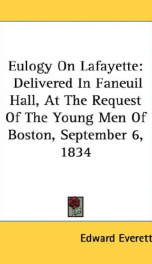
eulogy on lafayette delivered in faneuil hall at the request of the young men
Series:
Unknown
Year:
Unknown
Raiting:
3.5/5
Show more
add to favoritesadd In favorites

eulogy delivered at the dedication of the statue of daniel webster in boston s
Series:
Unknown
Year:
Unknown
Raiting:
4/5
Show more
add to favoritesadd In favorites
Book list

The Uses of AstronomyAn Oration Delivered at Albany on the 28th of July,1856
Series:
Unknown
Year:
Unknown
Raiting:
3.5/5
Show more
add to favoritesadd In favorites

eulogy on lafayette delivered in faneuil hall at the request of the young men
Series:
Unknown
Year:
Unknown
Raiting:
3.5/5
Show more
add to favoritesadd In favorites

eulogy delivered at the dedication of the statue of daniel webster in boston s
Series:
Unknown
Year:
Unknown
Raiting:
4/5
Show more
add to favoritesadd In favorites

dorchester in 1630 1776 and 1855 an oration delivered on the fourth of july
Series:
Unknown
Year:
Unknown
Raiting:
3/5
Show more
add to favoritesadd In favorites
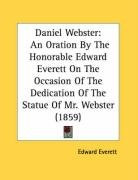
daniel webster an oration
Series:
Unknown
Year:
Unknown
Raiting:
4.5/5
The Pulpit And Rostrum. Daniel Webster, An Oration By The Honorable Edward Everett On The Occasion Of The Dedication Of The Statue Of Mr. Webster, In Boston, September 17th, 1859.
Show more
add to favoritesadd In favorites

daniel webster an oration on the occasion of the dedication of the statue of mr
Series:
Unknown
Year:
Unknown
Raiting:
4.5/5
Show more
add to favoritesadd In favorites

an oration delivered before the citizens of charlestown on the fifty second anni
Series:
Unknown
Year:
Unknown
Raiting:
3.5/5
Show more
add to favoritesadd In favorites
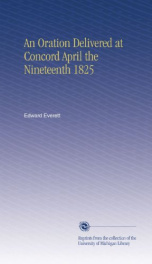
an oration delivered at concord april the nineteenth 1825
Series:
Unknown
Year:
Unknown
Raiting:
4.5/5
This volume is produced from digital images created through the University of Michigan University Library's preservation reformatting program. The Library seeks to preserve the intellectual content of items in a manner that facilitates and promotes a variety of uses. The digital reformatting process results in an electronic version of the text that can both be accessed online and used to create new print copies. This book and thousands of others can be found in the digital collections of the University of Michigan Library. The University Library also understands and values the utility of print, and makes reprints available through its Scholarly Publishing Office.
Show more
add to favoritesadd In favorites

an oration delivered at cambridge on the fiftieth anniversary of the declaratio
Series:
Unknown
Year:
Unknown
Raiting:
3/5
Show more
add to favoritesadd In favorites

an address delivered on the 28th of june 1830 the anniversary of the arrival o
Series:
Unknown
Year:
Unknown
Raiting:
4/5
Show more
add to favoritesadd In favorites

an address delivered before the literary societies of amherst college august 25
Series:
Unknown
Year:
Unknown
Raiting:
2.5/5
Show more
add to favoritesadd In favorites

address of the hon edward everett secretary of state at the anniversary of th
Series:
Unknown
Year:
Unknown
Raiting:
4/5
Show more
add to favoritesadd In favorites

address of the hon edward everett at the anniversary of the american colonizat
Series:
Unknown
Year:
Unknown
Raiting:
2.5/5
Show more
add to favoritesadd In favorites

address of the hon edward everett at the anniversary of the american coloniza
Series:
Unknown
Year:
Unknown
Raiting:
5/5
Show more
add to favoritesadd In favorites
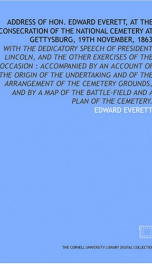
address of hon edward everett at the consecration of the national cemetery at
Series:
Unknown
Year:
Unknown
Raiting:
4/5
This volume is produced from digital images from the Cornell University Library Samuel J. May Anti-Slavery Collection
Show more
add to favoritesadd In favorites

account of the fund for the relief of east tennessee with a complete list of t
Series:
Unknown
Year:
Unknown
Raiting:
3/5
Show more
add to favoritesadd In favorites
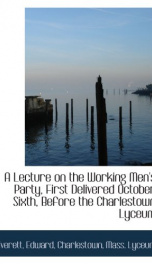
a lecture on the working mens party first delivered october sixth before the
Series:
Unknown
Year:
Unknown
Raiting:
3.5/5
Show more
add to favoritesadd In favorites
What readers are saying
What do you think? Write your own comment on this author!
write a commentif you like Everett Edward try:
readers also enjoyed
What readers are saying
What do you think? Write your own comment on this author!
write a commentGenre
if you like Everett Edward try:
readers also enjoyed
Do you want to read a book that interests you? It’s EASY!
Create an account and send a request for reading to other users on the Webpage of the book!
